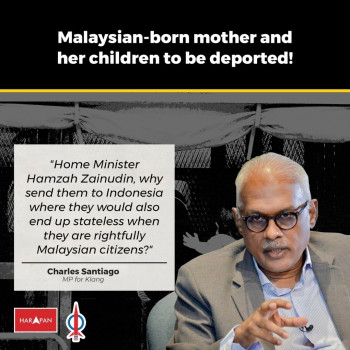By Ngeh Koo Ham, MP for Beruas
 Malaysia has experienced racial & religious harmony since Independence because the provisions of the Federal Constitution are respected and upheld. Recent religious conflict and tension occur when the National Registration Department refused to respect and uphold Article 11(1)of the Federal Constitution. The theme of my speech in Parliament was on national unity and the need to resolve religious hostilities. I hope to see peace and harmony between Sunni Muslims and Syiah Muslims. I hope to see peace and harmony between Muslims and non-Muslims.
Malaysia has experienced racial & religious harmony since Independence because the provisions of the Federal Constitution are respected and upheld. Recent religious conflict and tension occur when the National Registration Department refused to respect and uphold Article 11(1)of the Federal Constitution. The theme of my speech in Parliament was on national unity and the need to resolve religious hostilities. I hope to see peace and harmony between Sunni Muslims and Syiah Muslims. I hope to see peace and harmony between Muslims and non-Muslims.
I refer to the response by the Deputy Minister in the Prime Minister’s Department Razali Ibrahim to my speech in Parliament. He has stated that my view is not appropriate and that it can affect racial and religious harmony in the country. I have stated in Parliament that all including Muslims should respect the rights of a person to profess and practise his / her religion as guaranteed by Article 11(1) of the Federal Constitution. I disagree with the view expressed by the said Deputy Minister. In fact, the contrary is true. Malaysia has experienced religious harmony since independence because all parties respected the provisions of the Federal constitution. The recent religious conflict and tension occur because certain quarters especially the National Registration Department refused to respect and uphold the provisions of the Federal Constitution.
The problems arising from a non-muslim converting in and out of Islam all these years resolved themselves when the National Registration Department respects and upholds the provision of Article 11(1) of the Federal Constitution.
About 30 year ago the National Registration Department would accept the application to change the name, religion or other particulars of a person when a deed poll is done (A deed poll is a sworn statement made by an applicant stating his intention to change his name, religion or other particulars and have it advertised in a newspaper). Subsequently, it was said that in order to take into account the sensitivity of the muslims, it was not advisable to have it advertised. It was then agreed that the Majlis Agama Islam or the Islamic Department of the State would issue letters confirming that a person has left the Islamic faith and that was sufficient for the National Registration Department to make the necessary amendments to the identity card.
The National Registration Department now requires an applicant to obtain an order from the Syariah Court declaring that he/she has left Islam. Such a requirement contravenes Article 11(1) of the Federal Constitution as the decision to decide one’s faith now rests with a third party. Article 11(1) guarantees the absolute right to choose one’s religion and any decision otherwise to prevent him from this freedom will be unconstitutional and unacceptable.
The theme of my speech in Parliament on 11/6/2014 was on national unity and the need to reduce or prevent religious hostilities from arising. I quoted the findings from the Religious Freedom Project by Berkley Center for Religion, Peace and World Affairs, Georgetown University and the article ‘Fostering national unity’ by Wan Saiful Wan Jan, Chief Executive Officer of IDEAS (Institute for Democracy & Economic Affairs) to support the view that where there is lesser regulation of religion (read greater freedom to practice one’s religion) there will be lesser hostilities.
I quoted the example of the hostility between Syiah and Sunni Muslims when they use legal sanctions against one another though they have a lot in common. I mentioned that we do not see such hostility between Christians, Buddhists, Hindus, Taoists and other religions though they are more diverse. This is because the latter religions are practiced more freely with little legal regulation. I hope to see peace and harmony between Sunni Muslims and Syiah Muslims. I also hope to see peace and harmony between Muslims and Non-Muslims.
I then went on to say that our Federal Constitution has clear provisions to resolve the issues that are now causing religious tension and dispute in our country. The provisions in our Federal Constitution define clearly the relationship between Muslims and Non-Muslims and if observed by all will not cause the numerous incidences of unpleasant conflict between muslims and non-muslims in our country.
Three 3 issues often cause tension and conflict and they are as follows:
(i) The freedom of an individual to convert to or out of Islam.
(ii) The religion of a minor when one parent converts to or out of Islam; and
(iii) The personal laws applicable when one party to a marriage converts to or out of Islam.
The reason for the such a conflict is because in Malaysia Muslims follow one set of personal laws while non-muslims follow another set of personal laws.
Religious Freedom of An Individual to convert to or out of Islam
Article 11(1) provides that every person has the right to profess and practice his religion and subject to Article 11(4) to propagate it. Artlcle 11(4) provides that State law and in respect of the Federal Territories of Kuala Lumpur, Labuan and Putrajaya, federal law may control or restrict the propagation of any religious doctrine or belief among persons professing the religion of Islam.
Non-Muslims must accept the fact that laws may be passed to prohibit them from propagating their religion to people of the muslim faith.
Muslims must accept the fact that if a muslim on his/her own free will wants to leave the religion of Islam he/she must be allowed to do so. This God given freedom of choice and guaranteed by our Federal Constitution must be respected.
The religion of a minor when one parent converts to or out of Islam
Article 12(3) of the Federal Constitution provides that no person shall be required to receive instructions in or to take part in any ceremony or act of worship of a religion other than his own.
Article 12(4) provides that for the purpose of Article 12(3), the religion of a person under the age of 18 years shall be decided by his parent or guardian.
Therefore, when one parent converts to Islam, a child’s instruction in or to take part in any ceremony or an act of worship of a religion shall be determined by the parent who is given guardianship of the child until the age of 18, if there is a dispute over how the child should be brought up. After the age of 18, the child who is now an adult shall be at liberty to choose the religion of his choice as guaranteed by Article 11(1) of the Federal Constitution.
The personal laws applicable when one party to a marriage converts to and out of Islam
This problem can be easily resolved fairly by applying the law under which the couple’s marriage was celebrated. If they were married as non-muslims, the Law Reform (Divorce and Marriage) Act 1976 will apply and if the couple is married as muslims, the Islamic laws will apply. Marriage is a form of contract between the couple and therefore, it is fair that the law to be applied shall be the law under which the marriage was celebrated or contracted.
Problem arises when the National Registration Department refuses to change the particulars in a person’s identity card when one changes his/her religion as happened in the case of Zarena Abdullah Majid, a Hindu with a Muslim name, whose marriage to a Hindu man was disrupted by JAIS (Jabatan Agama Islam Selangor). Her case is but a tip of the ice berg. Many such couples cohabit together unmarried not because they do not want to get married but because our society do not allow them to do so.
Many children have been born out of wedlock through such unions. We scorn on unmarried couples and children born out of wedlock but in these cases our society must be scorned upon and even stand condemned for causing miseries to such couples who want to be married but prevented from doing so. Children born from such unions out of wedlock face untold miseries. These miseries and predicaments must be put to an end if we consider ourselves a civilized society.
I once again call on the National Registration Department to accept a statutory declaration as sufficient proof of the choice of the religion or personal faith that a person has made. Once the religious status of a person has been resolved through the change of the particulars in his/her identity card, the issues and conflicts in the many cases that we have seen will resolve on its own.



